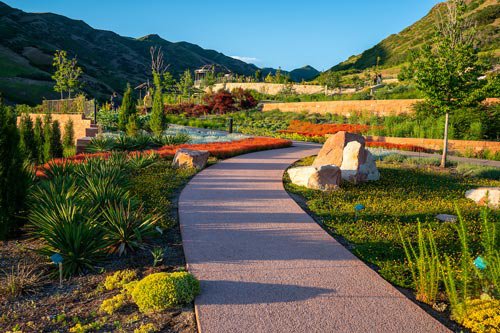High-Volume Gardening, Maximize Water Efficiency

High-Volume Gardening: Maximizing Yields with Minimal Water
Gardening on a grand scale, or high-volume gardening, is a rewarding pursuit. But when water resources are limited, it can feel like you're trying to grow a lush oasis in the middle of a desert. Fret not, fellow green-thumb enthusiast! With the right strategies, you can maximize water efficiency and still enjoy a bountiful harvest. Let's dive into some water-saving techniques and sustainable gardening practices that'll help you make the most of every drop.
Understanding Your Water Needs
Before we dive into water conservation, let's understand how much water your garden really needs. The EPA's WaterSense program recommends applying about 1 inch of water per week, either from rainfall or irrigation. So, grab a rain gauge and start tracking!
Choosing the Right Plants
Selecting the right plants is half the battle in high-volume gardening with limited water resources. Opt for drought-tolerant plants that can thrive with minimal water. Here are a few examples:
- Vegetables: Tomatoes, peppers, and cucumbers are relatively drought-tolerant once established. Leafy greens like spinach and lettuce, on the other hand, need consistent moisture.
- Flowers: Marigolds, black-eyed Susans, and coneflowers are water-wise choices that'll add color to your garden.
- Trees and Shrubs: Consider planting native species that are adapted to your region's climate and soil conditions.
Designing for Efficiency
The layout of your garden can also impact water usage. Here are a few design tips:
- Group plants with similar water needs together to make irrigation more efficient.
- Use mulch to retain soil moisture and suppress weeds. Organic mulches like straw or wood chips work best.
- Create microclimates by strategically placing structures like fences or walls to protect plants from wind and sun.
Irrigation Systems: Not All Are Created Equal
Investing in the right irrigation system can significantly reduce water waste. Here are a few options:
- Drip irrigation delivers water directly to plant roots, minimizing evaporation and promoting efficient water use.
- Soaker hoses are a low-tech alternative to drip irrigation, slowly releasing water along their length.
- Smart sprinkler systems use weather data to adjust watering schedules, ensuring your garden only gets what it needs.
Water-Saving Techniques for Every Season
Spring and Summer
- Water deeply and less frequently to encourage root growth and make plants more drought-resistant.
- Avoid watering during the heat of the day to minimize evaporation. Early morning or late evening are the best times.
Fall and Winter
- Reduce watering as temperatures drop and plants become dormant.
- Collect rainwater for use in your garden. A simple barrel connected to your gutter downspout can make a big difference.
Monitoring and Adjusting
Regularly check your garden for signs of water stress, such as wilting leaves or yellowing foliage. Adjust your watering schedule as needed to keep plants healthy and happy.
Conclusion
High-volume gardening with limited water resources is a challenge, but it's far from impossible. By choosing the right plants, designing efficiently, and implementing smart watering practices, you can grow a lush, productive garden without breaking the bank or the environment.
FAQs
-
Q: How can I tell if my plants need water? A: Stick your finger about 2 inches into the soil. If it feels dry, it's time to water.
-
Q: Can I use gray water from my home to water my garden? A: Yes, but avoid using water from the kitchen sink or toilet. Laundry water and shower water are good sources.
-
Q: How can I water my garden efficiently when I'm on vacation? A: Install a drip irrigation system with a timer, or ask a neighbor to help out.
-
Q: Can I use rainwater to fill my swimming pool? A: While it's possible, it's not recommended due to the risk of contamination.
-
Q: How can I reduce water waste from my sprinkler system? A: Ensure your sprinkler heads are in good working order and adjust the spray pattern to avoid watering sidewalks and driveways.
0 Response to " High-Volume Gardening, Maximize Water Efficiency"
Post a Comment